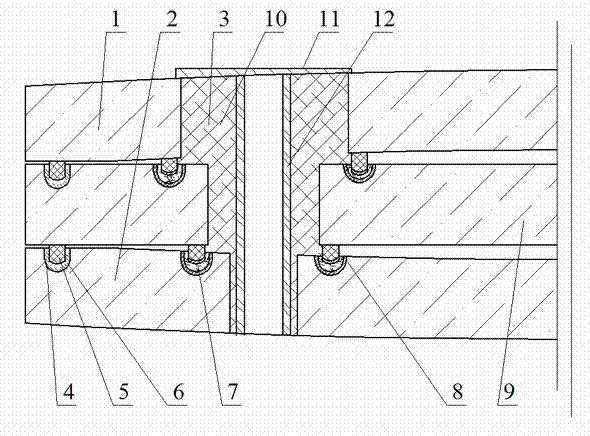High-temperature-sheet-combination convex double-vacuum-layer glass provided with edges sealed by sealing grooves and provided with mounting hole(s)
A double-vacuum, sealed tank technology, applied in glass production, glass molding, glass reshaping, etc., can solve the problems of inability to produce tempered vacuum glass, lack of support for upper and lower glass, and lack of vacuum glass. Achieve the effect of increased heating rate, uniform and reliable sealing, and elimination of variable deformation
- Summary
- Abstract
- Description
- Claims
- Application Information
AI Technical Summary
Problems solved by technology
Method used
Image
Examples
Embodiment
[0046] Embodiment: Referring to the accompanying drawings, the convex double vacuum laminated glass consists of an upper convex glass 1 , an intermediate glass 9 and a lower convex glass 2 . Its production method is as follows: First, according to the shape and size of the convex double vacuum layer glass to be produced, cut three flat glasses of the required size, and drill a through hole at the corners of the upper glass 1, the middle glass 9 and the lower glass 2. Air suction port (installation hole) 3, wherein the through hole on the upper glass 1 is larger than the through hole on the middle glass 9, and a sealing groove 6 is set on the upper surface periphery of the middle glass 9 and the lower glass 2 and the periphery of the air suction port 3 and the corresponding place , and carry out edging, chamfering, cleaning and drying to the three pieces of glass; secondly, spray the sealing strip 5 on the periphery of the lower surface of the upper glass 1 and the middle glass ...
PUM
| Property | Measurement | Unit |
|---|---|---|
| melting point | aaaaa | aaaaa |
Abstract
Description
Claims
Application Information
 Login to View More
Login to View More - R&D
- Intellectual Property
- Life Sciences
- Materials
- Tech Scout
- Unparalleled Data Quality
- Higher Quality Content
- 60% Fewer Hallucinations
Browse by: Latest US Patents, China's latest patents, Technical Efficacy Thesaurus, Application Domain, Technology Topic, Popular Technical Reports.
© 2025 PatSnap. All rights reserved.Legal|Privacy policy|Modern Slavery Act Transparency Statement|Sitemap|About US| Contact US: help@patsnap.com

